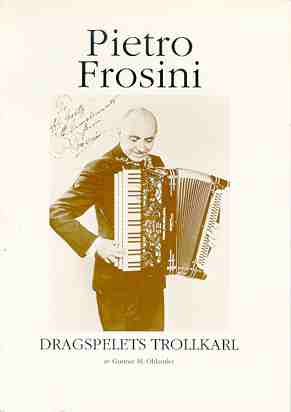
Forord
Dragspelets trollkarl
John Reuther
Forsinis familj
En konsert med Frosini
Blagskakning
Vad ar det som gor en forstapristagate?
Frosini berattar om sitt komponerande
Fragor och svar
Flera forslag och ideer fran Frosini
Orkideer till mina drgspelskollegor
Muskaliska evenemang med Frosini
Kommentarer i pressen
Dragspelets "Oscar"
"Frosini agnar sina sista krafter at musiken"
Birgit Kejving intervjuar
Frosinis inspelningar
Frosinis kompositioner
Frosinis arrangemang
Frosinis kompositoner for piano
Frosini ger goda rad
Frosini blev 66 ar gammal
language: Swedish
total pages: 104, softcover
39 photographs, diagrams and musical excepts
published: 1990
publisher: Frosinisallskapet
order from: Lars Ek
Norrtullsgatan 10, 3 tr
113 27 Stockholm
Sweden
tel. 08-30 60 86
Review by Henry Doktorski:
"In the United States there were three accordionist-composers who more than any other dominated the first half of the twentieth century; they were Pietro Frosini, Pietro Deiro and Anthony Galla-Rini. The first American classical accordion pieces were not written by professional composers, but by accordion vaudeville performers who wanted something more substantial to play."The Italian-born Pietro Frosini (1885-1951) studied piano, cornet, harmony, counterpoint and composition at the Municipal Conservatory of Fine Arts in Catani Sicily and the Milan Conservatory of Music. He emigrated to the United States in 1905, made his accordion debut at Fresno California, and became a vaudeville star who in 1911 gave a command performance before King George V of England. Frosini wrote approximately 200 original pieces for accordion; most were light and entertaining but some were more serious, like his virtuosic Variations on Carnival of Venice (1938) and Three Rhapsodies (1939). (quote from The Classical Squeezebox)
Although Pietro Frosini's influence began in the United States, his fame rapidly spread throughout Europe; in fact there are more Frosini lovers in Sweden than in the United States, as the city of Stockholm is home to not one, but two societies dedicated to Frosini: the Frosini-Deiro Foreningen directed by Bernt Bostrom and Frosinisallskapet directed by Lars Ek. This book Pietro Frosini was published by Frosinisallskapet.
Don't be intimidated that the book is written in Swedish, as much of it can be understood even by an English reader. For example, look at the first sentence in the first chapter, titled Dragspelets trollkarl (Accordion Wizard): "Pietro L. Giuffrida foddes den 9 augusti 1885 i provinsen Mascalucia pa Sicilien," which means in English: "Pietro L. Giuffrida was born on August 9th, 1885 in the Mascalucia province in Sicily." Of course, not all of the book is as easy to understand as this example, but I hope you get the idea.
The first chapter tells about Frosini's early life in Italy, his studies at the Conservatory of Milan (the cornet was his favorite instrument and Rossini his favorite composer), his fortuitous discovery by a vaudeville talent scout in Fresno, California and his subsequent rise to stardom as an accordionist. Also in the first chapter we read about his first published musical composition: The Chalice (1908) for voice and piano with lyrics by Edgar Selden, and his first commercial recording in 1909 (Edison Wax Cylinder 103): Wedding of the Winds.
The remaining chapters describe his career, including his association with John Reuther and other students. Included are comprehensive lists of his original compositions, arrangements, and recordings, as well as translations (in Swedish) of many of the articles Frosini wrote for the Accordion World magazine published in New York City in the 1930s and 1940s. The photographs (from 1906 until 1951) are a very important part of the book; for the most part they are clear and contributed greatly to my appreciation of this accordion pioneer. I believe Pietro Frosini, Dragspelets Trollkarl will be a treasure for all scholars of the accordion, as well as for fans of the "golden age" of the instrument.
| About The Free-Reed Review |
| Invitation to Contributors / Submission Guidelines |
| Back to The Free-Reed Review Contents
Page |
| Back
to The Classical Free-Reed, Inc. Home Page |